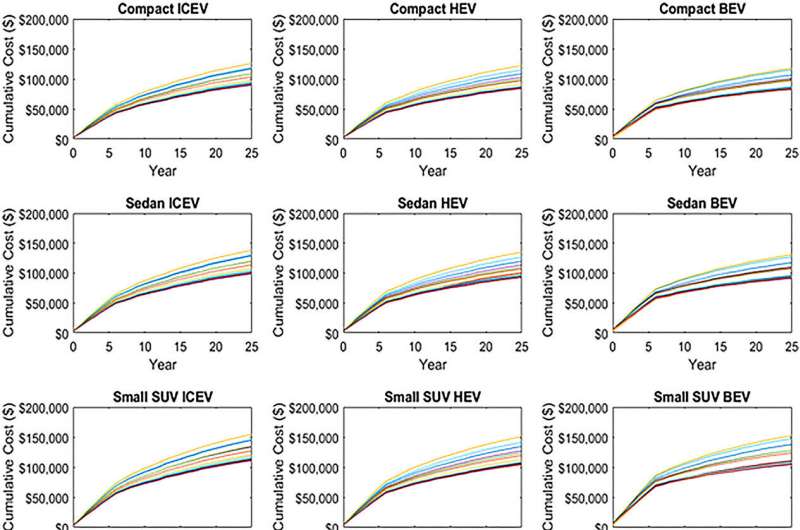This article has been reviewed according to Science X's editorial process and policies. Editors have highlighted the following attributes while ensuring the content's credibility:
fact-checked
peer-reviewed publication
trusted source
proofread
Electric vs. gasoline vehicles: Is EV ownership competitive in your area?

Is it actually cheaper to own an electric vehicle instead of a gas vehicle? It depends. University of Michigan researchers say that where you live matters. For instance, a midsize SUV costs more to own in Detroit than in San Francisco—one of the most expensive cities in the country.
Cumulative recurring costs for a midsize SUV across platforms—traditional gasoline, hybrid and electric—are higher in some cities when taking key factors into account: financing, annual fees, insurance, maintenance, repairs and fuel costs.
As the transportation sector undergoes a transformation to reduce carbon emissions—with a shift toward electric vehicles—researchers at the U-M School for Environment and Sustainability reviewed and analyzed the cost of owning any of these three vehicle platforms across 14 cities in the United States. In addition to accounting for the many components of vehicle ownership, they also evaluated how each component changes with vehicle size, powertrain, location, use patterns and over time.
Their study, published in the Journal of Industrial Ecology, found that gasoline vehicles are generally less expensive to purchase, but electric vehicles are less expensive over time through lower maintenance, repair and fuel costs. Whether or not the EV will break even with a similar gas vehicle depends on where the vehicle is operated, how the vehicle is charged and driven, and the size and range of the vehicle.
"Electric vehicle sales have seen significant growth, accounting for 8% of light-duty vehicle sales through May 2023, compared to 2% in 2020," said study lead author Maxwell Woody, a doctoral student at the School for Environment and Sustainability and researcher at the school's Center for Sustainable Systems.
Key findings include:
- Location matters: Across the 14 cities studied, the total cost of ownership of an electric midsize SUV varied by $52,000—nearly 40%—over the vehicle's entire lifetime. New York City and Detroit have the highest insurance costs. For gasoline vehicles, refueling is most expensive in San Francisco and Los Angeles and least expensive in Houston and Dallas. For electric vehicles, charging is most expensive in San Francisco, Los Angeles and Boston, and least expensive in Atlanta, Chicago and Cleveland.
- Charging scenarios: Different charging behaviors play a crucial role in total cost of ownership. Compared to using public charging, home charging lowers lifetime costs by $10,000 on average, and up to $26,000, even when including the cost of installing a charger. Many cities have time-of-use electricity rates, offering lower prices for charging a vehicle overnight—an important consideration for potential electric vehicle owners.
- Vehicle and battery size: Small and low-range electric vehicles are less expensive than similarly sized gas vehicles across all 14 cities in the study. Larger, long-range EVs are more expensive than their gas counterparts, while midsize EVs can reach cost parity in some cities.
- Incentives: Federal incentives, such as the $7,500 federal tax credit, play a pivotal role in accelerating the break-even point between electric vehicles and gasoline vehicles. In some cities, federal incentives can be combined with several thousand dollars of state and local incentives.
- Equity consideration: The higher purchase price of EVs is a challenge for low-income households, but operating costs offer savings compared to hybrid and traditional gas vehicles. Ensuring equitable access to home charging infrastructure, especially for renters and those in multifamily dwellings, is essential for a just transition to electrified transportation.
The study not only highlights the importance of electrification in reducing carbon emissions but also underscores the need for a nuanced understanding of the total cost of ownership.
"Our findings show that electric vehicles can be cost-competitive with gasoline vehicles for the 14 cities we studied across the U.S.," said senior author Gregory Keoleian, U-M professor of environment and sustainability and director of the Center for Sustainability Systems. "In addition to charging cost advantages for electric vehicles over gasoline fueling costs, there are lower maintenance and repair costs."
Electric vehicles are expected to become even more cost competitive as battery efficiency and manufacturing processes improve and if gasoline prices continue to escalate faster than electricity prices.
The shift toward electric vehicles plays a pivotal role in the effort to reduce carbon emissions in the transportation sector, the researchers say.
"In 2021, transportation was the leading source of greenhouse gas emissions in the United States, accounting for 28% of total emissions," Woody said. "EVs can help reduce emissions, but they need to be affordable.
"The cost difference between electric and gasoline vehicles depends on many individual and regional factors. Right now, an EV is less expensive for some users in some locations but there are strategies that both users and the government can take to make EVs less expensive for more users and in more locations."
More information: Maxwell Woody et al, Electric and gasoline vehicle total cost of ownership across US cities, Journal of Industrial Ecology (2024). DOI: 10.1111/jiec.13463



















